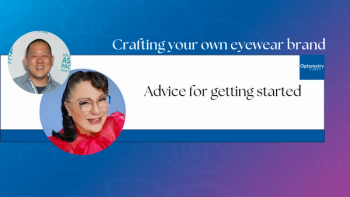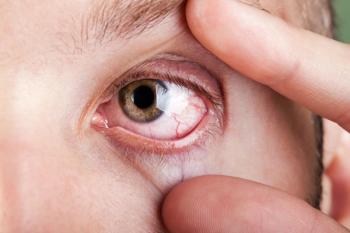
Meet the LEO founding board: Dr Howard Purcell

Howard Purcell, OD, FAAO, sat down with Optometry Times®' assistant managing editor Emily Kaiser to talk about her role on the founding board of Latinos en Optometry (LEO).
Howard Purcell, OD, FAAO, sat down with Optometry Times®' assistant managing editor Emily Kaiser to talk about his role on the founding board of
Founded by Diana Canto-Sims, OD, LEO has 5 goals:
- Increase the number of Latino students in optometry schools
- Provide resources and communication for Latinos in optometry
- Provide resources and communication for the eye care community who serve the Latino community
- Be a conduit between the Latino community and the eye care industry
- Provide CE to all optometry
The founding board of Latinos En Optometry includes Diana Canto-Sims, OD, CEO, Founder and Stylist of La Vida Eyewear and Co-Owner of Buena Vista Optical in Chicago, IL; Lawrence Chavez, Founder & CEO of EveryDay Contacts; Howard Purcell, OD, President and CEO of the New England College of Optometry; Hector Santiago, OD, PhD, Professor and Director of Research Activities at Inter American University of Puerto Rico School of Optometry; Glenda Aleman Moheeputh, OD, Founder and CEO of OK Love Myopia Control Experts; Karen Carrasquillo, OD, PhD, Senior Vice President Clinical and Professional Affairs at BostonSight; Diana Shechtman, OD, Fellow at the American Academy of Optometry and Optometric Retinal Society; and Lina Arango, OD, who currently works as an Independent Doctor with LTA Vision corporation.
Video transcript
Editor's note: This transcript has been edited for clarity.
What does LEO represent to you?
I'm thrilled to be part of this wonderful beginning and birth of LEO, Latinos en Optometry. And you know, personally, for me, I grew up in South Florida. I grew up in a Latino community and certainly appreciate the cultural differences and opportunities that exists.
More specifically for the role I'm currently in at New England College of Optometry, if we're going to ultimately make a difference, and we're going to create practitioners that look like we do and represent our community, then we have to start at the schools and colleges of optometry. We don't just create optometrists out of the air, and so my motivation, really, first of all, is an incredible group of people who are high energy, who are really in it, in my mind, for the right reasons.
But, the connection to academia is so critical. What we know, Emily, is that when your doctor looks like you, there's better outcomes. There's more trust. And as a result, we feel an obligation to make sure our students represent our community. The challenge has been that we are very diverse. You go to most of the schools and colleges of optometry, you're going to see a very diverse student population, but you're going to see gaps. And for us, those gaps are African American students and Latino students.
So we, not only just NECO [New England College of Optomerty] but really ASCO as a group—the Association of Schools and Colleges of Optometry, which is all the deans and presidents of all the schools and colleges, have certainly made an effort to focus on doing everything we can to be representative of our communities. This is one way, through LEO.
I can tell you, there's been a lot of efforts, and I commend them. The college here in Boston has participated in this and supporting Black applicants to optometry school. It's critically important. We haven't seen as much work, unfortunately, being done in the Latino communities. And, both of those are gaps for us.
So as I said, we've got to start at the schools and colleges. It's where we need to put our efforts forward, and through incredible support from the industry and others, we've got some good momentum going. And, I certainly believe that LEO is going to play a very important role in that.
Why is LEO an important organization for the eye care industry?
A: Well, I think I alluded to a little bit of that. But, "Why is the LEO important to the industry?" is really at the heart of the whole matter. It's about diversification of our profession. But, it even goes beyond that, Emily.
It's about education. It's about cultural competency. It's about assuring that our graduates, no matter what their background, where they are, what experiences they've had culturally, that they at least have a sensitivity to that.
So when you look at the mission of LEO, you know, it really looks at schools and colleges, and hopefully I've explained that that's where it starts. We have to begin there.
But, it's also an educational process for those of us who are familiar and those of us not, to appreciate their differences. And to understand that, I think, puts us in a better position to care for people of all different backgrounds, races, nationalities, whatever it may be. Our country is evolving and changing, and our future success, I believe, relies on that.
How do you hope to see LEO serving the community?
A: Well, I think LEO is just in its infancy right now. But, the energy and passion that's behind it is so clear to me. And we have representations in the industry side today that represent the Latino community that I think have just been looking and waiting for an opportunity to try to support these efforts. So I think this can make a huge difference.
Look at what the NOA, the National Optometric Association, represents, the Black community. It's 50 years old, and it's worked extremely hard. You have Black EyeCare Perspective, they're doing a wonderful job and really stimulating interest in the profession. We've got to get not only to the HBCUs, but we have to go to the historic Latino institutions, and make sure we're making those same type of efforts. I can even give you a quick data point that I happen to have.
So, just to give you some idea. If we look at Black and Latinos, I know we're focusing on Latino community a little bit more, but if we go and look at applicants going back to 2015-2016, about 4% of applicants were Black, about 9% of applicants were self described as Latino. Fast forward to 2020-2023. This year, we now have about 4.68% Black applicants and 12% Latino. They haven't made as much of a impact as we'd like to, so these efforts are just so critical. A lot of it honestly, Emily, is awareness. It's, "What is optometry? I'm not even sure what it is," "Is it an option for me?" and, "What about the financial components of it?"
So with the industry and the efforts that LEO is making, we hope we can begin to impact on some of those; creating the awareness and the interest in optometry. I mean, we believe we can convince anybody that optometry is a great career. Honestly, we do. It's just having the opportunity of getting in there and talking about it and showing a path.
Our industry has been incredibly supportive, so we can even reduce the cost of education if there's an opportunity for employment. So there's a lot of different ways to get around what we know some of the historical obstacles have been. The other is, we meet a lot of students who are first-generation students. And we, as academic institutions, need to make sure we're preparing for that and assisting these students.
I mean, I admire these young people so much, because they don't have that role model in the family in many cases, not all, certainly, but in many cases. When they don't, I think it puts a little bit more of the burden on us as an institution to not only recruit, but candidly, the most important part, Emily, is creating an environment at the institution where everybody feels like they belong and they feel like they made a good choice to come. They may look around and not see a lot of people look like them, at least today, but at least we create those environments where we hope they say, "I made a good choice. I feel comfortable here. I feel like I'm welcome, and I'm going to help you recruit more people who look like me." We have to start somewhere.
And, you know, people are all over the board. I gave you the averages. Some institutions, as an example, South Florida and Texas, they tend to do a little bit better in recruiting Latino students. Boston, it's a little more of a challenge here for us. But we are all in this together. We're all working hard—not only LEO—but also ASCO and the schools and colleges. Because we absolutely appreciate and understand how vitally important it is.
Let me also just add, we appreciate Optometry Times® showing an interest in this. I will just say I make myself available at any time if anyone who's reading the piece or listening to this, wants to ask some questions, wants to participate, wants to get involved.
We have an incredible board, but the small board we have is not going to get it all done. We need others. So, I appreciate the opportunity to share what we're trying to do, and to see if others want to get on board and help support it. It doesn't matter if you come from the Latino community or not. I hope you can have, like I do, an appreciation for the importance of the diversification of optometry, and this is a key component to that.
So, we look forward to seeing people become part of what we're trying to do. It's a high-energy group with a lot of passion, and a lot of fun, and with a really important purpose.
Allyship is the only way that everything's ever gonna get done. You can't just rely on one community to take the brunt of the work.
A: That's very true. But also being able to put yourself in other shoes, I think, and understand it. And for me, I've been very blessed. I had a fairly easy path, and it isn't that way for everybody, and we appreciate that. If we can make it a little easier, if we can make that transition a little bit smoother, I think that's part of it.
You know, for LEO, it's about increasing the number of students that represent the community. It's about resources and communication that the group is going to try its best to do, and we need help in doing that. Resources, as I said, and a conduit between the Latino community and the eye care industry. Then, continuing education not only just on cultural competencies, but some of the unique issues we face when seeing a Latino community. There are unique issues just like in the Black community and others.
So, these are things we just wanted to continue to develop a sensitivity towards. We remain available, all of us, at LEO to answer any questions, any comments, any volunteers to help the effort. We welcome that.
What has been the most exciting thing that you have experienced since LEO has begun? And what are you most looking forward to?
A: So, the most exciting thing was our event at Vision Expo East. It sort of started to bring it to life. We had been on Zoom talking about this, and all internally getting super excited about what can happen. Then it kind of came to life. We all, for some of us, [were] in the same room, at the same time, together personally for the first time since this really was born. There was energy and passion, the music was playing. I'm a terrible dancer, but I was out there doing my thing anyway. The emotion of seeing people come around. Some people, who came knowing it, other people were just walking by and asking what's going on, and we tried to share.
I do want to say, just like Optometry Times®, The Vision Council has been incredible in supporting what LEO is doing. Without them, we wouldn't have been able to have this wonderful event at Vision Expo. So, that to me has been super exciting.
There's so much I'm looking forward to here, but I'll boil it down to say I'm looking forward to making an impact, to making a difference. That next time you interview me, I can tell you that we've got on now from 12% of Latino applicants to 20% or 15%. Just to at least bring that pool in and create the awareness of optometry in different communities that either don't know or aren't aware, or don't feel like they could do it or don't have a path to see clearly how they could do it. We want to show them that path.
We have some incredible role models in LEO that will, I know, inspire so many others, as long as we can get in front of them and do the things we do. So, we welcome contributions. Without funds, you know, we can't get a whole lot done. So far, the community has been incredibly generous.
Is there anything else you'd like to be sure that we touch on?
A. No, I appreciate the opportunity. I would just say, if you could add some contact information for LEO, that would be great. We'd love people to get in touch with us, tell us what they'd like to see us doing, what we need to be doing or volunteer to help in one way, shape, or form. It could be money, but it also could be arms, legs, bodies, and energy.
It's important getting out there in the community. Even my colleagues were out there practicing. When you see a young person sitting in your chair, and they're playing with the dials, or they're asking you questions about what you're looking at through that microscope, mention to them about this incredible profession.
I will tell you sitting here at the college, 90% of our applicants talk about another optometrist who had an influence on them. [Someone] who showed them what a great profession this was, who talked to them about it. So, I guess my ask would be, if I dare do so, not only to consider joining LEO and support what we're doing, but every day in your office, be that inspiration to the future of this profession. And in particular, where those gaps exist, try to be as encouraging as possible. That would be absolutely fantastic, and I know will make a difference.
Newsletter
Want more insights like this? Subscribe to Optometry Times and get clinical pearls and practice tips delivered straight to your inbox.













































